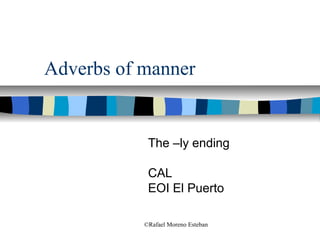
Adverbs of manner
- 1. Adverbs of manner The –ly ending CAL EOI El Puerto ©Rafael Moreno Esteban
- 2. Adverbs of manner • Adverbs of manner are the largest group of adverbs. Most adverbs of manner are closely related to corresponding adjectives. • Although some words can be used as either adjectives or adverbs, in most cases, adverbs of manner are formed by adding ly to the corresponding adjectives. • In most cases, ly is simply added to the positive form of the adjective. For example: • Adjective • Adverb of Manner • bad • badly • complete • completely • normal • normally • surprising • surprisingly ©Rafael Moreno Esteban
- 3. Adjectives ending in ic However, when the adjective ends in ic, the syllable al is usually added before the ly ending. For example: • Adjective • Adverb of Manner • dramatic • dramatically • scientific • scientifically • specific • specifically • basic • basically ©Rafael Moreno Esteban
- 4. When the adjective ends in le preceded by a vowel, in most Adjectives ending in le cases, ly is simply added to the positive form of the adjective. For example: When the adjective ends in le preceded by a consonant, Adjective Adverb of Manner the final e is usually changed agile agilely to y, to form the ly ending. sole solely For example: However, in the case of the Adjective Adverb of adjective whole, the final e is Manner removed before the ending ly is favorable added: humble favorably Adjective Adverb of Manner simple humbly whole wholly simply ©Rafael Moreno Esteban
- 5. Adjectives ending in ll When the adjective ends in ll, only y is added. For example: Adjective Adverb of Manner dull dully full fully shrill shrilly Adjectives ending in ue When the adjective ends in ue, the final e is usually omitted before the ending ly is added. For example: Adjective Adverb of Manner due duly true truly ©Rafael Moreno Esteban
- 6. Adjectives ending in y When the adjective ends in y However, in the case of the preceded by a consonant, the y adjectives shy and sly, ly is is usually changed to i before simply added to the positive the ending ly is added. For form of the adjective: example: shy shyly busy busily sly slyly easy easily happy happily When the adjective ends in y preceded by a vowel, in most However, in the case of the cases, ly is simply added to the adjective gay, y is changed to i positive form of the adjective. before the ending ly is added: For example: gay gaily coy coyly grey greyly ©Rafael Moreno Esteban
- 7. Adverbs of frequency • It should be noted that while most adverbs which end in ly are adverbs of manner, other types of adverb may also end in ly. For instance, consequently and subsequently are connecting adverbs. The following are adverbs of frequency which are formed by adding ly to the corresponding adjectives. Adjective Adverb of Frequency frequent frequently rare rarely usual usually ©Rafael Moreno Esteban
- 8. The following tables give examples of adverbs of manner, location, time and frequency which do not end in -ly. Adjective Adverb of Manner Adjective Adverb of Location good well far far fast fast high high hard hard low low little little near near loud loud or loudly wide wide much much straight straight Adjective Adverb of Frequency Adjective Adverb of Time daily daily early early monthly monthly first first weekly weekly late late yearly yearly long long ©Rafael Moreno Esteban
- 9. It should also be noted that there are several adjectives ending in ly which have no corresponding adverbs: • friendly • When it is desired to use one of these • likely words to modify a verb, an adverb • lively phrase of manner may be used. • lonely • In the following examples, the adverb phrases are underlined. • silly • ugly • e.g. He behaved in a friendly manner. They acted in a silly way. ©Rafael Moreno Esteban
- 10. Adverbs With and Without ly Endings Adverb Meaning hard with effort high opposite of low late opposite of early near opposite of far wide opposite of narrow Adverb Meaning hardly scarcely highly very; very well lately recently nearly almost widely commonly ©Rafael Moreno Esteban
